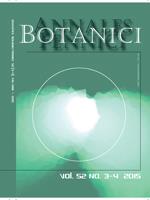Vegetation gaps are considered to be important for germination and establishment of species, which are weak competitors but have long-lived seeds in the soil. Vegetative growth is a colonization strategy especially important in regularly disturbed grasslands. In a salt marsh on the Baltic coast of Germany, we studied (i) the role of seedling recruitment and vegetative growth in recolonization of gaps, (ii) if gaps are necessary for seedling recruitment and (iii) whether gaps contribute to species diversity and composition of the salt marsh. We carried out a two-factorial field experiment during two years. We created 48 gaps of 0.04 m2 in size in autumn 2006. We eliminated the seed bank by sterilization and prevented vegetative growth into these gaps with dense meshes. We used a full-factorial design with four treatments: (1) seed bank and vegetative growth eliminated, (2) seed bank eliminated and vegetative growth intact, (3) seed bank intact and vegetative growth eliminated, (4) both intact. Seedlings and ramets were counted in these gaps in summers 2007 and 2008. In the established vegetation we counted the dicot seedlings in 12 control plots without manipulation. Both seed bank and vegetative growth contributed to the recolonization of the gaps. Nevertheless, seedling establishment was limited due to flooding of the site for six weeks in summer 2007. Vegetative growth was more successful in recolonizing the gaps. No increase in species richness occurred due to gaps in this salt marsh. Interestingly, more dicot seedlings emerged in the undisturbed control plots than in the gaps with intact seed bank. Vegetation gaps, thus, do not appear to be necessary for establishment of dicots in Baltic salt marshes. Nevertheless, some dicot species profit from gaps. We assume that the erect structure of the vegetation dominated by the evergreen plants Juncus gerardii, Triglochin maritimum and Plantago maritima facilitates germination in the undisturbed vegetation.
How to translate text using browser tools
1 August 2015
Recolonization and Facilitation in Baltic Salt Marsh Vegetation
Kristin Ludewig,
Antonia Wanner,
Kai Jensen
ACCESS THE FULL ARTICLE

Annales Botanici Fennici
Vol. 52 • No. 3–4
August 2015
Vol. 52 • No. 3–4
August 2015




